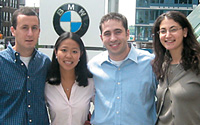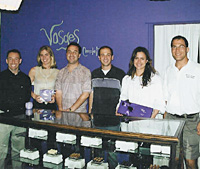Experiential
learning gives students jump on jobs
By
Ed Finkel
This spring,
Kellogg School student Adam Kaufman ’05 and four classmates
flew to New York to suggest how BMW of Manhattan executives
should price the firm’s used cars. The group met in
a conference room, where the students explained their methodology
and bottom-line results.
Kaufman
remembers feeling a little nervous, but says the butterflies
proved manageable because he and his classmates had worked
for BMW all quarter. “We had gotten to know the client
well. It wasn’t like we were talking to people we had
never met before,” he says, adding that the presentation
was interactive and that the executives asked a lot of questions.
“This
Q&A encouraged us [to believe] that what we were working
on would be used going forward,” says Kaufman.
| |
 |
| |
For
their LEAP project, Charles Naaman, Meranee Phing, Adam
Kaufman and Rachel Lester, all '05, worked with BMW
of Manhattan to improve the firm's inventory tools.
Not pictured: Michelle Tom '05, also part of the team. |
| |
|
Kellogg
students have many opportunities to participate in consulting
projects for companies large and small as part of their coursework.
Perhaps the most intensive and diversified of these comes
via the Learning
Through Experience and Action Program (LEAP), a one-credit
course offered each spring that typically enrolls some 75
students, and through which Kaufman and his classmates ended
up working for BMW.
The 10-year-old
program, created by Professor Bala
V. Balachandran, serves as a “capstone” course
for mostly first-year students who have conducted projects
related to their academic focus, but who want broader experience,
says Fran Langewisch, assistant dean and director of student
life, who administers the program.
“All
kinds of functionally oriented courses exist at Kellogg,”
says Balachandran. “To complement this curriculum, we
thought we should have a course that is interdisciplinary
and provides the opportunity to look at a problem from a high-level
perspective.” With LEAP, Balachandran says students
and faculty devise an interdisciplinary project that can be
implemented, increasing the value and impact of the research
for the partnering firm.
The program,
dubbed “McKinsey 101” by Forbes magazine,
recruits businesses from students’ input, through alumni
contacts and from the ranks of those who have previously taken
part, Langewisch says.
The students
work in groups of three to five, meaning that more than a
dozen companies per quarter participate.
The class
differs from most in that the consulting project almost literally
is the class. Students hear several guest lectures on topics
associated with project management, resulting in an academically
rigorous experience, yet much of the time is devoted to intensive
consulting with faculty guidance, Balachandran says.
The class
culminates in a final presentation to the companies; four
presentations are chosen to be judged for a cash prize. The
three final winners typically receive $1,500, $1,250 and $1,000,
respectively.
But students
gain a more valuable takeaway than money, and the companies,
which pay the school a nominal fee, benefit too. “The
students get the benefit of practical experience in a not-for-profit
or small business,” Balachandran says. “The majority
of big, multinational companies can afford consulting firms.
But what about a mom-and-pop company, or a nonprofit organization?
There is a tremendous synergy.”
Langewisch
notes that corporations such as Home Depot, Motorola and 7-Eleven
have participated, although they’re not the norm.
 |
|
| Sweet
deal: James Lange '01, Julie Lang, Steven Altschul '01,
Rob Grossi '01, Katrina Markoff and Jonathan Gonsky '01
pose in the original Vosges Chocolates store in Chicago's
Bucktown in 2000. Lang and Markoff are the firm's co-founders,
for which the Kellogg students worked during their LEAP
course. |
|
| |
|
Students
who sign up for the class typically are generalists or those
who wish to gain consulting experience or explore a particular
industry, she says. “We have a few people who have even
parlayed their LEAP experience into an internship or a full-time
job, though we certainly don’t guarantee this outcome,”
she says.
For Dana
Hagendorf ’01, who did not participate in LEAP as a
student but who has since played an active role in the program
as director of marketing and communications at BMW of Manhattan,
the course provided an opportunity to give back to Kellogg
and involve students in a real-world project.
At the
same time, the subsidiary of BMW of North America, which is
one of three corporate-owned dealerships, has benefited greatly
from the students’ work. In 2002, students researched
how to market the MiniCooper car in New York. The following
year, they determined how best to market the dealership’s
motorcycle stock.
Last
spring, Kaufman, Michelle Tom, Rachel Lester, Charles Naaman
and Meranee Phingbodhipakkiya (all ’05) created a tool
to help determine which leased cars would be most profitable
for the dealership’s pre-owned department to buy back.
To do
this, they put together a regression model based on two years
of sales data that accounted for 50 variables, ranging from
interior and exterior color, to engine sizes, to option packages,
says Kaufman, who worked for Ford Motor Corp. last summer.
He believes his work for BMW will help his auto industry career.
“BMW
has a lot of sales expertise in terms of what cars would be
valuable to sell, and they wanted some way to quantify that,”
says Kaufman. “Our work allowed them to verify their
team’s gut feeling while helping junior sales staff
determine what cars to bring onto their lots. The project
was interesting to us because it was quantitative. We saw
a definite value to what we were doing, and the work got both
our team and the client really fired up.”
“The
biggest thing our project focused on was inventory. It helped
BMW determine the best product mix for them to keep in stock,”
says Tom, who worked for Deloitte Consulting for half a decade
before enrolling in the Kellogg School. The LEAP experience
gave her a “new look” at consulting, something
she appreciated.
“Having
been with the same company for five years, you learn to work
one way and stick with that way,” she says. “The
LEAP project opened my eyes to the different steps that people
take. It solidified for me the fact that I could consult across
different industries.”
Hagendorf
says BMW of Manhattan in September implemented the quantitative
tool, which will be one of several methods of evaluation the
dealership uses in determining its pre-owned mix. “This
student research supports real projects,” she says.
“They created a formalized decision process, and we
use the tool they built.”
Katrina
Markoff voices similar sentiments. Markoff is the owner of
Chicago-based confectioner Vosges Chocolates, which had one
neighborhood store and an online presence before LEAP students
undertook a project for the firm in 2000. Now the company
has a store on Michigan Ave. and four other locations. Its
products are also sold in upscale retailers such as Nordstrom’s.
“It
was great,” Markoff says of LEAP. “We opened our
store downtown in large part because of the insights derived
through the students’ consulting.”
Students
who worked on that project focused on building a growth strategy
for the company by performing an online customer survey and
various financial analyses, says Steven Altschul, who worked
on the project along with Robert Grossi, James Lange and Jonathan
Gonsky (all ’01).
“We
tried to take some of their assumptions and either prove or
disprove them with fact-based information,” says Altschul,
now director of business development and strategic planning
with small software and telecommunications firm Magenta-netLogic.
“It was a great way to work with a growing company and
with the founders and owners to help them solve some of their
business problems,” he says. “The exposure with
Vosges was the first time I had worked with such a small company
and seen the professional satisfaction this can bring.”
Grossi,
now a consultant with Toronto-based Boston Consulting Group,
says the LEAP project was his first experience in consulting,
an arena he already had set his sights on. “It captured
the minds and hearts of the team,” he says. “We
knew that everything we were doing would have a real impact
on the business. We took it very seriously.”
The project
also captured the students’ palettes.
“They
gave us free samples all the time,” Grossi says with
a laugh. |



